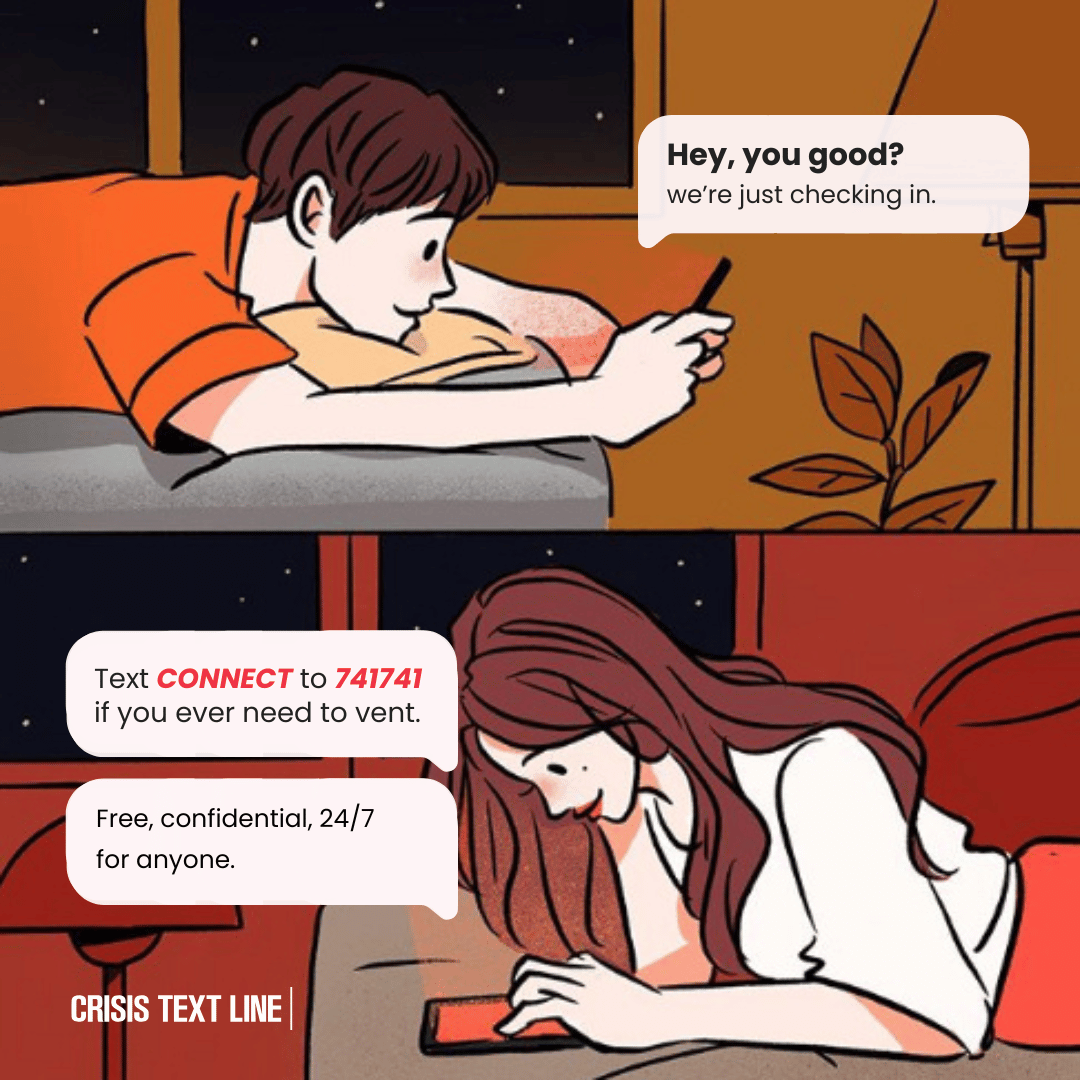Emotional Abuse

How to Deal with Emotional Abuse
Text CONNECT to 741741 for free, confidential support from a trained volunteer Crisis Counselor, available 24/7.
What is Emotional Abuse #
Everyone has disagreements in relationships. There is a point, however, in which a disagreement turns into abuse. Abuse—sometimes called domestic violence or intimate partner violence (IPV)—is consistent actions used to assert power or control over someone in a relationship.
Some believe emotional abuse isn’t “as bad” as physical abuse and this is simply not true. Anything hurtful is just that—hurtful. There is no need to compare or judge one’s painful experience against another. Emotional abuse can have a devastating impact on a person’s mental health, leaving inner wounds that may take years to heal.
Emotional abuse, also called psychological or mental abuse, includes actions that aim to manipulate or harm someone emotionally, affecting a person’s mental well-being.
What emotional abuse can look like:
- Repeatedly guilting
- Shaming
- Blaming
Emotional abuse is one type of relationship abuse. It’s often hard to detect because there are no visible or physical signs, but it is still serious and harmful. If you are experiencing emotional abuse, you’re not alone and we’re here for you. Text CONNECT to 741741 to reach a live volunteer Crisis Counselor for support.
The Cycle of Emotional Abuse #
The cycle of abuse is a common pattern in abusive relationships. While not all abusive relationships follow this, many include four stages:. tension building, threat of violence, reconciliation, and calm, according to Verywell Health.
- First stage – Tension building: The cycle begins with a rise in tension and a breakdown in communication. The victim may feel as if they must walk on eggshells in order to avoid angering the other person. They may start to feel like they can’t do anything right..
- Second stage – Threat of violence: Tension escalates to emotional or verbal outbursts. . The abuser may lash out emotionally or verbally, threatening to harm themselves or the other person. This stage can be deeply damaging, resulting in emotional trauma such as post-traumatic stress disorder.
- Third stage – Reconciliation: Here, the abuser apologizes for their behavior and promises to change. This stage can be immensely confusing for the victim, especially if they care for or love the abuser. The abuser often appears to be genuinely remorseful, inspiring hope in the victim that things will get better. Hope may return, but the cycle often repeats.
- Fourth stage – Calm: This is a period of temporary peace in which the abuser is on their best behavior. During this stage, the victim may feel as if things have improved and may even believe that the abuse is behind them. Unfortunately, this calm does not last long. The cycle of abuse often starts again with the return of tension.
Emotional Abuse and Domestic Violence #
When emotional abuse occurs in an intimate relationship, it’s a form of domestic violence. Domestic violence refers to a pattern of behavior used by one partner to gain power and control over the other in an intimate relationship. The abuser may isolate their partner by hiding their car keys, criticize the partner’s friends or family, or guilt their partner into spending all their time with the abuser. Acting superior, creating chaos in the relationship, or invalidating their partner are other tactics often utilized by abusers in intimate relationships.
Clearly emotional abuse is an integral part of domestic violence, as it is used to manipulate, control, and demean the victim. It can be just as psychologically damaging as physical abuse, leaving the victim feeling powerless, afraid, and alone.
Types of Emotional Abuse #
Emotional abuse is a type of abuse that can occur in any relationship, regardless of gender, age, or sexual orientation.
It involves using words, actions, or behaviors to control, manipulate, or degrade another person. Emotional abuse can take many forms, from subtle comments to overt threats, and it can leave lasting scars on a person’s mental and emotional well-being.
Some of the most common forms of emotional abuse include:
- Verbal attacks (e.g., name-calling or yelling)
- Constant criticism
- Belittling
- Gaslighting (A technique in which a person tries to convince someone that their reality is untrue.)
- Controlling behavior
These actions can be particularly hard to notice, as they may not leave any physical evidence, and they can be difficult to recognize or report. Anyone can be a victim of emotional abuse, so it is important to be aware of the signs and seek help if you or someone you know is experiencing it. Text CONNECT to 741741 for support.
- Emotional abuse in relationships: Emotional abuse in relationships can involve a range of harmful behaviors, such as controlling and manipulating a partner’s actions or emotions, constant criticism and belittling, threatening to harm oneself or the partner, and withholding affection or attention as a form of punishment. Emotional abuse from parents: Emotional harm is inflicted onto children and can manifest in various ways. This abuse can be characterized by the use of verbal or nonverbal tactics to manipulate, shame, or control the child, ultimately undermining their sense of belonging, self-worth, and well-being.
- Emotional abuse in marriage: This involves one spouse emotionally abusing the other. It may include a partner belittling the other’s opinions, controlling their behavior, or constantly criticizing them. Other forms of emotional abuse can include gaslighting, manipulation, and isolation from friends and family.
- Elder emotional abuse: Elder emotional abuse often involves neglect, isolation, and verbal abuse. Examples of elder emotional abuse include a caregiver yelling or speaking down to the elderly person, withholding necessary care, or threatening to withdraw love and support if they do not comply with the caregiver’s demands.
- Sibling emotional abuse: Sibling emotional abuse can take many forms such as teasing, belittling, scapegoating, or constantly comparing one sibling to another.
- Emotional abuse in the workplace: This may manifest as a manager constantly belittling or demeaning an employee or their work, making excessive demands or threats, or denying opportunities for growth and advancement. Other forms of emotional abuse in the workplace include isolating an employee, spreading rumors or gossip, or using humiliation as a form of punishment.
- Emotional abuse online: Online emotional abuse often involves cyberbullying, trolling, or harassment. Examples of this abuse include sending threatening messages or comments, making hurtful remarks about someone’s appearance, spreading rumors or lies, and engaging in online shaming or public humiliation.
Signs of Emotional Abuse #
It is important to recognize the signs of emotional abuse, as it can be difficult to identify and can have serious long-term effects on victims. Keep in mind that emotional abuse can occur in all manner of relationships, from parent-child to boss-employee, and not just in romantic partnerships. This section will provide an overview of emotional abuse behaviors and the potential signs of emotional abuse in individuals, with the goal of promoting awareness and understanding of this type of abuse.
Emotionally abusive behaviors:
- Stonewalling: The abuser shuts down and refuses to communicate, often by giving the victim the silent treatment. It can leave the victim feeling confused, frustrated, and unheard.
- Gaslighting: The abuser makes the victim question their own thoughts, feelings, and experiences. They might tell the victim that they’re imagining things or that they’re being overly sensitive, which can cause the victim to feel dismissed, experience extreme self-doubt, or worry that they’re going crazy.
- Accusations: An abusive partner might constantly accuse their partner of cheating or flirting with other people, even if there’s no evidence to support these claims. This can create a sense of mistrust and jealousy in the relationship.
- Isolating: An abuser might try to cut the other person off from friends and family, making the victim feel like they have no one to turn to. This can make it harder for the victim to leave the relationship.
- Criticism: An abuser might constantly criticize, belittle, or shame the other person’s appearance, behavior, or choices, making the victim feel that they’re not good enough. This can lead to low self-esteem and a sense of worthlessness.
- Verbal abuse: This includes name-calling, insults, and yelling. Verbal abuse can be just as damaging as physical abuse and can leave the victim feeling scared and anxious.
- Shaming and blaming: An abuser may try to make the other person feel ashamed or guilty for things that are not their fault. They may blame their partner for things that “go wrong” in the relationship, even if these circumstances were not at all in the victim’s control.
- Controlling: This can take many forms, such as going through the victim’s phone or constantly checking up on their whereabouts. The abuser might try to control the victim’s behavior, making them feel as if they have no agency in the relationship.
- Economic abuse: This may involve the abuser giving the other person an allowance, restricting access to the family income, or taking the victim’s money. With finances being directly tied to survival in our society, this restriction can cause the victim to feel completely dependent on their abuser.
- Coercion and threats: The abuser may threaten to hurt the other person or leave them if their demands are not met. Alternatively, the abuser may claim they will hurt themselves if the other person tries to leave them.
Emotional abuse victim behavior:
- Anxiety or depression: Emotional abuse can cause long-lasting damage to a person’s mental health, leading to symptoms like anxiety or depression. The victim may feel hopeless, helpless, and unable to cope with their daily life.
- Low self-esteem: Constant criticism, shaming, and blaming can cause the victim to feel that they’re not good enough. This can lead to low self-esteem and feelings of worthlessness.
- Withdrawal from friends and family: Victims of emotional abuse may feel like they have nowhere to turn, leading them to withdraw from their friends and family. They may feel like they’re a burden or that no one will believe them if they attempt to speak about their experience of abuse.
- Feelings of guilt and shame: Abusers often make their victims feel like the abuse is their fault, leading to feelings of guilt and shame. The victim may feel like they’re to blame for everything that goes wrong in the relationship.
- Fear and anxiety: Emotional abuse can leave the victim feeling constantly on edge. They may appear restless and have trouble sitting still. Alternatively, they may experience fatigue and struggle to find the energy to engage in activities they used to enjoy.
- Post-traumatic stress disorder (PTSD) and trauma: Victims of emotional abuse may experience symptoms of PTSD and trauma. They may have flashbacks or nightmares, feel triggered by certain events or situations, and struggle with feelings of detachment.
- Physical symptoms: Emotional abuse can cause physical symptoms like headaches, stomachaches, and insomnia. The victim may also experience fatigue, muscle tension, and other physical symptoms related to stress and anxiety.
- Substance abuse: Some victims of emotional abuse turn to drugs or alcohol as a way of coping with the abuse. This can lead to addiction and other long-term health problems.
- Self-harm and suicidal thoughts: In extreme cases, emotional abuse can lead to self-harm and suicidal thoughts. The victim may feel like there’s no way out of the situation and that the only escape is through self-harm or suicide.
If these behaviors or feelings sound familiar, it’s important to seek support. You don’t have to face this alone. Text CONNECT to 741741 for support.
Find Help for Emotional Abuse #
Finding help for emotional abuse is essential because it can have such serious long-term effects on a person’s mental and physical health. If you’ve been asking yourself, “Who can I talk to about emotional abuse?” You’ve come to the right place.
If you or someone you know is experiencing emotional abuse, there are resources available for support and guidance. Talking to a trusted friend, family member, teacher, or counselor can be a good first step in seeking help. Crisis Text Line is always here to help with its fast, direct text line option with 24/7 support by texting CONNECT to 741741. It’s important to remember that seeking help for emotional abuse is not a sign of weakness, but rather a brave step towards healing and recovery.
There are a number of strategies that one can use to cope with emotional abuse. Many find listening to music quite helpful. Others make art, enjoy entertainment (films, TV shows, podcasts,) exercise, meditate, read, write, spend time with pets, play video games, go into nature, cook, or volunteer.
How to help someone in an emotionally abusive relationship
If you know someone who is in an abusive situation , it can be difficult to know how to help. The most important thing you can do is to listen to them without judgment and offer support. Let them know that you believe them and that the abuse is not their fault. If they’re not ready to leave the relationship, don’t push them. Instead, offer to help them develop a safety plan that can help keep them safe in the meantime. Remember that leaving an abusive relationship is a process, and it may take time for your loved one to feel ready to take that step. In the meantime, be patient and continue to offer your support and love.
Recovering from emotional abuse
The long-term effects of emotional abuse can be significant and can impact a person’s mental and physical health, as well as their ability to form and maintain healthy relationships. Emotional abuse can cause feelings of anxiety, depression, low self-esteem, and shame. It can also lead to post-traumatic stress disorder (PTSD). PTSD is a condition that can develop after experiencing a traumatic event, such as emotional abuse, and can cause symptoms like flashbacks, nightmares, and severe anxiety. While PTSD is commonly associated with physical or sexual violence, emotional abuse can also cause the same level of trauma and may require professional treatment to address. It’s important to seek help if you or someone you know is experiencing the long-term effects of emotional abuse to prevent further harm and begin the healing process.
Healing from emotional abuse can be a difficult and complex process, but it is possible with time, patience, and support. The first step in healing is acknowledging that the abuse has occurred and accepting that it was not your fault. Therapy can be a valuable tool in the healing process, allowing you to work through the trauma, develop coping mechanisms, and rebuild self-esteem. It’s also important to practice self-care, which can include joyful movement, eating nourishing foods, and engaging in favorite activities. Building a support system of friends, family, or a support group can also provide a safe space to process the abuse and receive validation and understanding. Ultimately, healing from emotional abuse is a journey that requires courage, compassion, and self-love, but with time and the right resources, it is possible to move forward and rebuild a fulfilling life.
Other emotional abuse resources
For immediate help with emotional abuse or domestic violence, reach out to the 24/7 National Domestic Violence Hotline.
There are many other resources that provide education and nonjudgmental support to anyone experiencing emotional abuse. Here are some that we recommend. You can find a full list of mental health resources here.
Love Is Respect – Educates young people to prevent and end abusive relationships by offering support and resources. (Deaf/Hard-of-Hearing approved)
My Plan App – Offers intimate partner violence safety planning with personalized safety information and resources for self or someone else in an abusive relationship.
Frequently Asked Questions about Emotional Abuse #
Spread the Word! Provide 741741 to a Friend #
You never know who might need Crisis Text Line. Pass it on and tell the people in your life to text CONNECT to 741741 if they ever need support.

Your donation can save lives.
Help us keep our life-saving services free for those who need them most.



